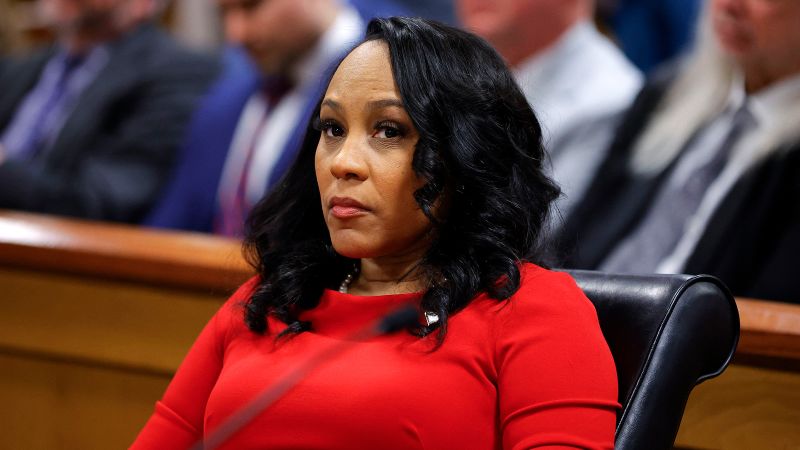Fulton County District Attorney Fani Willis is pushing back on the latest attempt by former President Donald Trump and his co-defendants to disqualify her entire office from prosecuting the election subversion case in Georgia, according to a new court filing Monday.
Willis asked the Georgia Court of Appeals to uphold Fulton County Superior Court Judge Scott McAfee’s initial ruling that allowed her to remain on the criminal case if her top prosecutor, Nathan Wade, resigned. Wade resigned within hours of McAfee’s ruling last month.
The appeals court is weighing a request from Trump and several others charged in Georgia to review and overturn McAfee’s earlier decision.
Willis argued on Monday that the appeals court should deny that request.
“There being no error by the trial court, the present application merely reflects the applicants’ dissatisfaction with the trial court’s proper application of well-established law to the facts,” Willis and her team wrote in Monday’s filing. “Because the applicants have wholly failed to carry their burden of persuasion, this Court should decline interlocutory review.”
In Monday’s filing, the Fulton County district attorney’s office insisted again that there was no conflict of interest and said that Willis’ comments about race playing a role in criticism of her office did not rise to misconduct requiring disqualification.
“Given the trial court’s factual findings, which are supported by the record, the trial court correctly ruled the District Attorney did not engage in disqualifying forensic misconduct,” the prosecutors wrote.
“Days of evidence and testimony failed to disclose anything like a calculated pre-trial plan designed to prejudice the defendants or secure their convictions. The applicants have not identified any public statement injecting the District Attorney’s personal belief as to the defendants’ guilt or appealing to the public weighing of evidence,” the district attorney’s team wrote.
While Willis has attempted to shift attention back to the criminal case itself after the detour over ethics allegations for more than two months, Trump and his co-defendants are still arguing the romantic relationship between Willis and Wade created a conflict of interest.
“At a minimum, DA Willis and her office should have been disqualified from prosecuting the case,” Trump’s lead Georgia-based attorney Steve Sadow wrote when he asked the appeals court to take up his case. “The Georgia Court of Appeals should grant the application and accept the interlocutory appeal for consideration on the merits.”
It is now up to the Georgia Court of Appeals to decide if they want to review the decision not to disqualify Willis and her office. This appeal doesn’t pause the prosecution, which continues to play out before trial.
Willis plans to press ahead with her goal of putting Trump and his co-defendants on trial before the November presidential election, according to three people familiar with her thinking, but a trial date for the sprawling racketeering case has not been scheduled yet.
The former president also wants the Georgia Court of Appeals to review McAfee’s refusal earlier this month to toss the indictment on the grounds that Trump’s efforts to overturn the 2020 election were protected by the First Amendment. Most of Trump’s co-defendants joined in a motion seeking permission to appeal McAfee’s decision.
“Based on the more than 45+ (mostly U.S. Supreme Court) cases and historical precedent cited to the Court, Defendants believe their arguments are well-founded and fall squarely within the almost absolute First Amendment protections in the context of their core political speech regarding 2020 Presidential election contest,” the defense attorneys wrote in a Monday filing.
For the effort to proceed, McAfee would have to approve the request from Trump and the other defendants. Then it would be up to the Georgia Court of Appeals to decide whether to take up the matter.
A spokesperson for the district attorney declined to comment. Prosecutors have previously argued that the free speech question should be left up to a jury at trial.
Read the full article here





